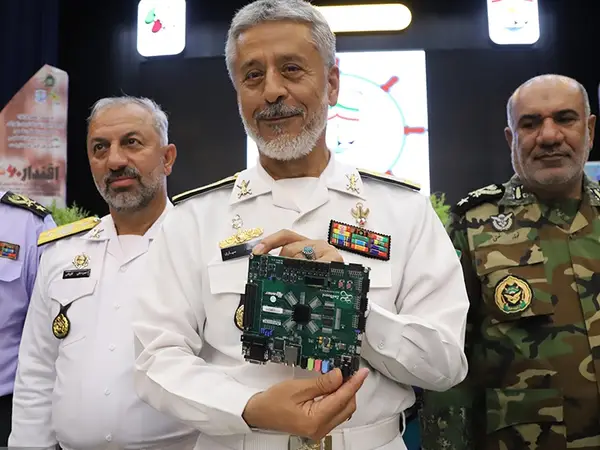The unveiling of a proclaimed “quantum processor” produced by the Iranian army has drawn controversy and ridicule in Persian social media.
The device was showcased as “the first product of the quantum processing algorithm” on the sidelines of a meeting on "Quantum Processing" at the Navy’s Imam Khomeini Maritime University in Noshahr, in the northern province of Mazandaran last week.
Rear Admiral Habibollah Sayyari, the Coordinating Deputy of the Islamic Republic’s Army and the former Commander of the Navy, officially unveiled the device after he delivered a speech about the country’s advances in modern technologies.
Describing quantum and plasma technologies as the leading fields in future wars, he said, “In order to deal with future threats, it is necessary to pay attention to new and ground-breaking technologies.”
The controversy ensued after people started publishing photos of the exact processing board, which apparently is a low-cost development board by US-based hardware and software company Digilent, that has been in the market for about $600. The name of the brand and the model (ZedBoard Zynq-7000 ARM/FPGA SoC Development Board) is clearly seen on the board that was advertised as the achievement of the Army.
In the description of the device, state media said it is “a system to counter navigation deception in detecting surface vessels using the quantum algorithms.” There is in fact no quantum component, such as a quantum circuit or processor, in the device. Therefore, if the device does not have such a processor, it cannot use an esoteric quantum algorithm, a step-by-step procedure, where each step can be performed on a quantum computer.
A few days after the ceremony, Iran’s Supreme Leader Ali Khamenei said, “In the era of artificial intelligence, quantum, and the Internet, it is not possible to work with the same tools as 40 years ago. The tools must be relevant to the times.”
Ali Akbar Salehi, the former head of the Atomic Energy Organization of Iran (AEOI), repeatedly talked about developments in Iran’s quantum technology sphere and also inaugurated Iran’s first large laboratory dedicated to quantum physics in 2021. “The Atomic Energy Organization began work on quantum technology in 2016 and it is responsible for monitoring scientific developments throughout the world and prioritizing high tech technologies”, he said, but almost no tangible results were announced by the lab.
Using modern technology terminology has always been a propaganda tactic by the Islamic Republic’s officials, the latest of which was Iran’s so-called “hypersonic missile,” a descriptor that is convoluted with technical inaccuracies – to say the least.
Famously, in April 2020, soon after the beginning of the COVID-19 pandemic, Iran’s Revolutionary Guards claimed it had developed a "breakthrough" super-device that could detect people infected with coronavirus within 100 meters. IRGC Commander-in-chief Hossein Salami unveiled the device, which consisted of a handheld detector, an antenna, and a dish-like part that could detect the virus “with a reliability rate of around 80 percent” and promised its mass production.
Such claims are predominantly seen in military contexts in Iran but they have also become a laughing stock since President Ebrahim Raisi took office. He is known to have only elementary school education apart from Islamic seminary courses.
Earlier in the year, a university professor’s uninformed claim that the Python software program can 'predict the future' has caused new embarrassment for the government in Iran, in a scandal that was named ‘Python-Gate.’
